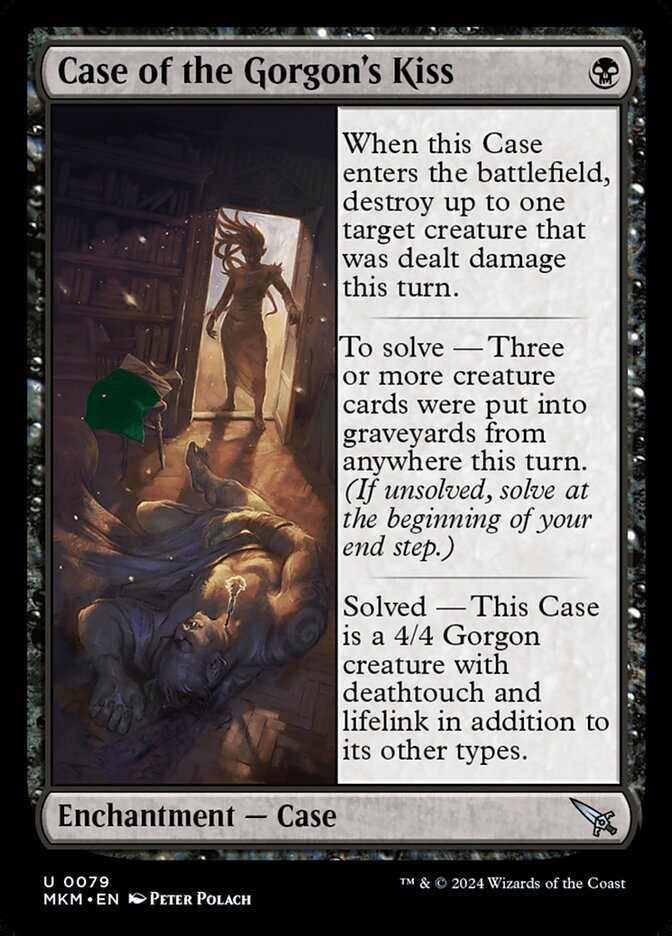
Case of the Gorgon's Kiss {B}
Enchantment — Case
When this Case enters, destroy up to one target creature that was dealt damage this turn.
To solve — Three or more creature cards were put into graveyards from anywhere this turn. (If unsolved, solve at the beginning of your end step.)
Solved — This Case is a 4/4 Gorgon creature with deathtouch and lifelink in addition to its other types.
Illustrated by Peter Polach
- Standard
- Legal
- Alchemy
- Legal
- Pioneer
- Legal
- Explorer
- Legal
- Modern
- Legal
- Historic
- Legal
- Legacy
- Legal
- Brawl
- Legal
- Vintage
- Legal
- Timeless
- Legal
- Commander
- Legal
- Pauper
- Not Legal
- Oathbreaker
- Legal
- Penny
- Legal
| Prints | USD | EUR | TIX |
|---|---|---|---|
| Murders at Karlov Manor #79 | $0.02 | €0.10 | 0.02 |
| Variation Of |
|---|
| Case of the Gorgon's Kiss #79 |
Alternate art Case of the Gorgon's Kiss: Green cloth
Ten MKM cards were given “prism” alt arts with one distinct feature recolored.
Toolbox
Buy This Card
Notes and Rules Information for Case of the Gorgon's Kiss:
- The "to solve" ability of Case of the Gorgon's Kiss looks at what type the cards are after they move to the graveyard to determine whether the ability should trigger, regardless of any types they may have had before they were in the graveyard. For example, a creature card that has become a noncreature permanent will count toward the ability's condition when it's put into a graveyard. By contrast, a noncreature card that has become a creature on the battlefield will not count toward the ability's condition when it's put into a graveyard. (2024-02-02)
- Tokens are not cards and, as such, do not count toward Case of the Gorgon's Kiss "to solve" ability. (2024-02-02)
- Each Case has two special keyword abilities: to solve and solved. (2024-02-02)
- "To Solve — [condition]" means "At the beginning of your end step, if [condition] and this Case is not solved, it becomes solved." (2024-02-02)
- The meaning of "solved" differs based on what type of ability follows it. "Solved — [activated ability]" means "[Activated ability]. Activate only if this Case is solved." Activated abilities contain a colon. They're generally written "[Cost]: [Effect]." (2024-02-02)
- "Solved — [Triggered ability]" means "[Triggered ability]. This ability triggers only if this Case is solved." Triggered abilities use the word "when," "whenever," or "at." They're often written as "[Trigger condition], [effect]." (2024-02-02)
- "Solved — [static ability]" means "As long as this Case is solved, [static ability]." Static abilities are written as statements, such as "Creatures you control get +1/+1" or "Instant and sorcery spells you cast cost {1} less to cast." (2024-02-02)
- "To solve" abilities will check for their condition twice: once when the ability would trigger, and once when it resolves. If the condition isn't true at the beginning of your end step, the ability won't trigger at all. If the condition isn't true when the ability resolves, the Case won't become solved. (2024-02-02)
- Once a Case becomes solved, it stays solved until it leaves the battlefield. (2024-02-02)
- Cases don't lose their other abilities when they become solved. (2024-02-02)
- Being solved is not part of a permanent's copiable values. A permanent that becomes a copy of a solved Case is not solved. A solved Case that somehow becomes a copy of a different Case stays solved. (2024-02-02)